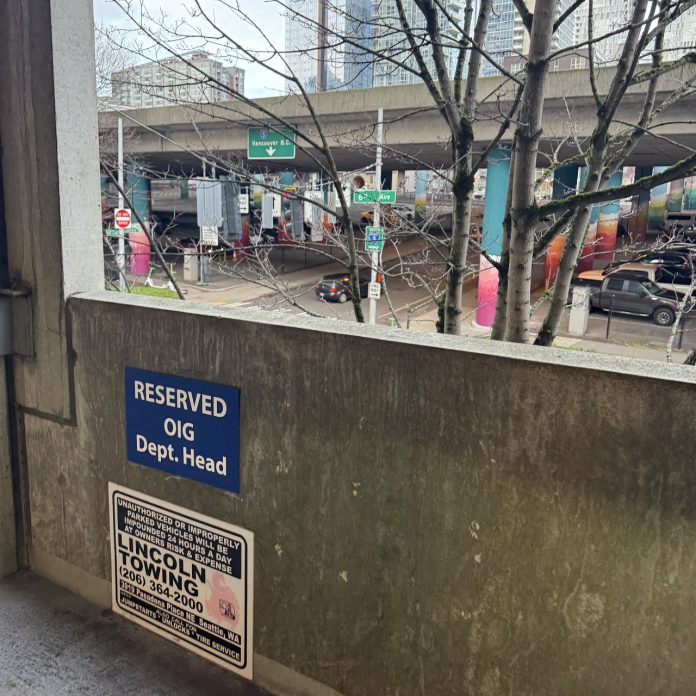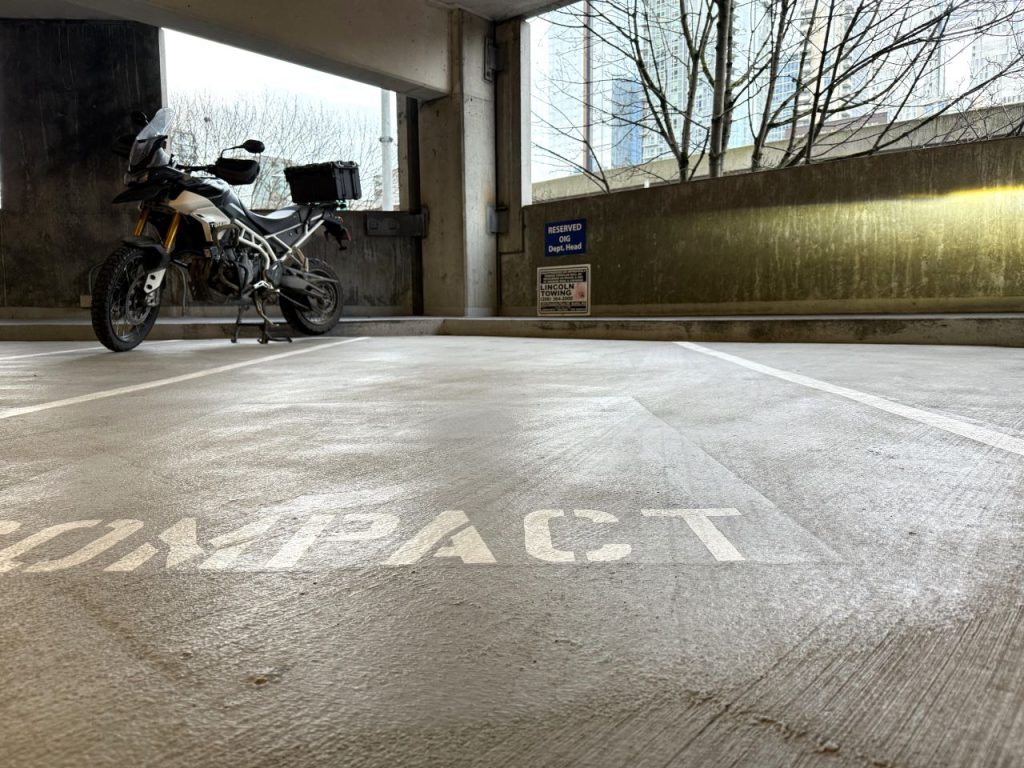
Tasked with upholding Seattle police accountability, Inspector General Lisa Judge appears to have broken the rules herself to get free parking on the public dime.
Since the start of her tenure in 2018, the head of the Office of Inspector General (OIG), Lisa Judge, appears to have misused public funds by deducting money from her office’s general fund to pay to park her private vehicle in a City-owned parking space.
This is illegal under City law, which also dictates that an employee must set up payroll deduction to pay for a parking space.
Badge swipe records reveal that between 2019 and 2024, Judge appears to have been in-office relatively rarely, even before the pandemic, but that the $385 per month for her private vehicle space in the SeaPark garage still regularly came out of her office’s general fund.
According to records The Urbanist obtained, current through July 2024, Judge has deducted $26,055 for her parking costs. If the practice has continued, as of this writing, Judge will have used more than $29,000 of her office’s general fund to park her private vehicle.
Based on other records the Urbanist obtained, including half-filled-out forms for a parking space, and an email chain asking about payroll deduction, it is unclear whether the ongoing deduction from the office’s general fund is an ongoing mistake — but, if it is, Judge won’t clear that up for The Urbanist.
As of this writing, Judge still has not returned months’ worth of both emails and phone calls. No one from the Seattle City Council, which is in charge of appointing the city’s inspector general, returned a request for comment.

Though $26,055 may be a drop in the bucket of the office’s more than $5 million budget, The Urbanist confirmed with both Finance and Administrative Services (FAS) and Seattle’s Ethics and Elections Commission (SEEC) that it is still illegal to use general fund monies to pay for a private vehicle parking space. There can be exceptions, but those exceptions must be described and OK’d by the employee’s office in writing.
Other prominent parking pilfering cases
Other City of Seattle employees have been caught and fined for misusing public funds for private parking purposes in the past.
In 2016, a KIRO investigations team followed and confronted a municipal court judge for violating City parking rules. The KIRO team discovered that the late judge appears to have lied about the number of passengers he had in the car, in order to take advantage of the City’s significantly discounted carpool parking rate. Over the course of his decade-long use of the spot, Bonner had saved $12,000 at taxpayer expense.
Back then, KIRO said, such a violation of the City’s parking laws “could result in cancellation of a permit, an impounded vehicle – or a $5,000 fine and up to a year in jail.”
A few years later, in 2019, SEEC discovered that three City street-use inspectors had misused their employee access cards to park their private vehicles in the Seattle Municipal Tower and the SeaPark Garage across the street. City employees are only supposed to use their access cards for City purposes, SEEC said, and parking private vehicles does not count.
After reaching individual settlement agreements with the City, the street-use employees were fined a combined $640, twice the amount that they would have paid for the $20 daily parking rate in effect at the time for each parking violation.
However, SEEC also said that if the employees violated their settlement agreements, it could impose up to a $5,000-per-violation fine.
A symptom of a wobbly police accountability system?
In contrast with low-level transportation department employees who were fined, Judge is in a highly visible executive role where upholding ethical standards is one of her key responsibilities.
The Office of the Inspector General is one of three police accountability bodies added amid police reforms triggered by Seattle’s 2012 consent decree. According to the OIG’s website, the office is supposed to oversee the management, practices, and policies of SPD and the Office of Police Accountability (OPA).
Police accountability advocates have argued that the city’s three-legged accountability stool is wobbly and not working well. The OIG has not escaped its own share of public scrutiny, starting with an ethics complaint filed against the office and the OIG’s fellow accountability agency, the OPA, in 2021. Just this past October, the OIG faced criticism for shutting down an audit into mutual aid from other police departments, which appears to have skirted normal limitations on conduct and weapon use.
Judge also allegedly retaliated against a whistleblower in the City record’s department, who sounded the alarm that she was improperly releasing records relating to OIG’s investigation into former police chief Adrian Diaz, blowing off some journalists’ record requests while giving special treatment to others.
Missing documentation
Marc Mayo, an investigator and trainer at the Seattle Office of Ethics and Elections (SEEC), confirmed that, to his best knowledge, no one could deduct money from their office’s general fund to pay to park their private vehicle without a very specific, documented reason.
“Say you have weekend duties,” Mayo said in a November 2024 interview. “The department may say you can use parking for whatever purposes, but only for those purposes and only for those times.”
The Urbanist confirmed via an extensive records search through OIG that, outside the budget item showing this routine deduction from OIG’s general fund, there are no records tracking, much less approving, Judge’s OIG general fund use within City Finance, which manages payroll. OIG records staff checked with both FAS and Legislative Finance. However, it is clearly stated on the City’s parking form — which is supposed to go to the City’s finance department — that “you are paying for the privilege of garage parking when space is available,” and “[t]his will authorize you to deduct from my payroll warrant the amount of [amount] per month for Garage Parking.”
An email record shows that OIG records staff met with Peter Armato, a finance manager in the legislative branch’s finance office, in July 2024 to fill a records request seeking records for Judge’s parking. In a follow-up email, Armato told OIG records staff that he had “no further information other than GL [general ledger] transactions.”
When OIG records staff asked whether the parking expenditures reflected were for a parking space for Judge, Armato replied, “Unfortunately I have no details on who is paid or where it goes.”
“[T]his was all setup [sic] by OIG staff in 2018 and was never communicated to any of us,” Armato wrote.
An email record from 2019 shows that former Deputy Inspector General Amy Tsai attempted to set up a parking space for Judge by way of payroll deduction. Judge did not participate in the email thread meant to set up her spot.

In response to The Urbanist’s query about the issue, Tsai said in an email that she could not recall the time period in question, because it was too long ago. Tsai left OIG in March 2022.
There also exists a partially completed — but never submitted — parking application to FAS for a reserved spot in a different garage, Seattle Municipal Tower, that Judge appears to have begun in April 2019. Another record from September 2018 shows that Tsai forwarded Judge a SeaPark parking validation form. No records exist showing that Judge ever completed either.
There are also no records of the money coming out of Judge’s salary as a payroll deduction, which FAS spokesperson Melissa Mixon said would be needed for such a parking spot, absent a departmental write-up.
FAS’s procedures regarding parking detail this, and state that an employee must turn in a completed parking permit form to FAS to begin payroll deductions for a spot. FAS does not have this required parking permit form from Judge, who was reappointed for her second six-year term in the summer of 2024.
Despite the considerable parking fees being incurred on the public dime, it is unclear how often Judge is actually in the office.
Judge’s spotty record of working from the office
Seattle City employees are required to swipe their badges each time they enter a City structure on official business, including parking garages and their specific offices. Following an office location change in 2019, OIG’s office has two different entrances. Employees may swipe into either entrance.
Badge swipe data The Urbanist obtained indicates that Judge swiped her badge a total of 178 times to enter either entry point of the OIG office between July 2019 and the end of July 2024.
Assuming a regular, five-day work week, minus the time City employees largely spent working remotely, during the first two years of the pandemic, Judge’s attendance still appears significantly less than the approximate total of 765 working days in that period.
However, as of summer 2024, many City of Seattle employees still were not in office five days per week, and had only been mandated to return to the office two days per week, starting in 2022. Citing the importance to the economic recovery of Downtown, Seattle Mayor Bruce Harrell mandated that City executive branch employees return to the office at least three days per week starting in November 2024.
Assuming a two-day, in-office work week, beginning on Jan. 1, 2022, there would have been 394 working days total in the period swipe data is available for Judge. This suggests she was on-site for approximately 45% of the time she was technically required to be.
Because some badge swipes could indicate entry to the parking garage only, it is possible that Judge may have parked in the garage without necessarily going to work.
Equally possible is that the badge swipe data does not fully capture her office entries, as she could have, for instance, followed another employee through the door, after the other employee alone swiped their badge.
The Urbanist lacks badge swipe data from April 2018, when Judge took office, up to the period of OIG’s transition to a new office in July 2019.
It’s unclear what might come of Judge’s personal use of OIG general funds for a City parking spot, because SEEC does not automatically launch an investigation. It “wouldn’t be a good use of resources,” Mayo said. First, he said, FAS asks an at-fault employee to pay back the money they owe. Only if they refuse will SEEC get involved.

